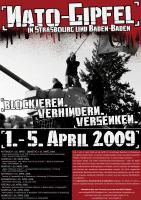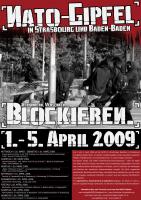
|
linksunten Archiv |
|
Sabotage the NATO Summit
Info | Ticker Smash Capitalism – Sabotage the NATO Summit Against the Police State, War, and the Order of Things On April 3rd and 4th, the NATO [North Atlantic Treaty Organization] Member States will be meeting in Strasbourg [South East France] and Baden-Baden [South West Germany]. The occasion: the 60th Anniversary of the creation of NATO. Not simply a birthday party, the summit will discuss the sustainability of the military alliance. Prepared to resist using a wide variety of tactics, peace activists to Unionists all the way to extra-parliamentary radical Leftists are expected, alongside the full force of state repression. For us, the NATO summit is an opportunity to demonstrate the critique of the senseless practices of capitalism, including the creation of a police state and the accompanying bureaucratization of society, and to bring that critique into practice. For this, we call for the sabotage of the NATO Summit, the dismantling of the police deployment, and, through the protests, make visible a radical criticism of the current order.
Global Warzone Among the invited guests, there will be members of the military and governmental, politicians and agents from the military lobby and private economy, who are deeply bound with NATO. Among the many items up for discussion—like the integration of the new Eastern European member states—above all stands the future direction of NATO itself. NATO had originally constructed itself as a anti-Communist military alliance of the capitalist states against the state-socialist Eastern Bloc. Until the fall of the Soviet Union, it aimed its politics directly against them. The politics of the NATO Member states essentially consisted on the one hand military deterrence—which lead to the arms race of the so-called Cold War—and, on the other hand, of numerous, often armed proxy conflicts within spheres of influence. With the decline of state socialism at the end of the 1980s, so too did NATOs central enemy and its fundamental justification disappear. Since them, NATO has not managed to get much sorted out. One only need look at the projects, beginning with destruction of Yugoslavia, to see how badly they have gone. When in Iraq, a pacification began to be seen—where fundamental NATO Member States were involved were gradually burdened with the high cost of invasion and the administration of the occupation—the situation in Afghanistan worsened. With the end of Bloc confrontation that marked a bipolar world, the conflicts between the capitalist states over influence, raw materials, and access to markets have increased. This became clear in the run-up to the invasion of Iraq, with the conflict between Germany and France on the one side and the U.S. on the other. This had most certainly nothing to do with the “pacifism” of “Old Europe”, rather far more with the diverging interests and good business relations with the then Iraqi Regime. For that reason they have been ready when their business partner got hanged and the new, profitable contracts to organize the new Iraq were about to get negotiated. An increase of potential of conflict (Konfliktualität) that emerged at the beginning of the 1990s surfaced in the numerous conflicts and minor wars—for instance in Africa, through more or less direct participation of the Western States, and also Russia and China—who, for their part, also look out for their own interests. In conflicts over raw materials and spheres of influence, the former state-socialist countries are not going to be left out. This was made apparent in fall 2008 when Russia battered NATO member state Georgia. Furthermore, former developing countries like India and Pakistan registered their demands with much pushing and shoving. In the face of cotemporary development of crises, the former conflicts threaten to flare up.
The State, Violence, and Capital In wars and military conflicts, violence is a daily occurrence. Indeed, capitalism functions simply as an imposing force, one fundamentally based on exploitation, coercion, and violence. As a requirement, capitalist production cleaves society into classes: On the one side stands the owner of societal means of production, the capitalists, and, on the other side, the people who must sell their labour power to survive. The capitalist buys this labour power to produce commodities. The labour power is bought and sold and takes on commodity form. The possibility arises to achieve profit for the capitalist through the exchange of commodities, in the correspondence of wage for living labour to market value and the appropriation of the product that emerged from the process of production. Not only the control and organization of the production process are lost to the capitalist, but the surplus product itself, produced from the actions of labour power, is appropriated. The profits of the capitalists are generated through the exploitation of labour power to aid in the production of surplus-value. The achievement of profits is the driving force of social production. The satisfaction of material and social requirements of people is subordinated to the goals of capitalist production. They play a limited role in capitalism, whenever it helps maximizing profits. Capitalism is not about making a better life for people— long possible considering the size of global wealth—on the contrary, the maximizing of profit is the end in itself. Under the pressure generated by the competition between capitalists, a large part of the achieved profits flows to the production process in order to achieve further profits. With that, the accumulation of capital is designed to function without end. Indeed, the creation itself of capitalist conditions of productions was only made possible through state violence. One example can be found in people who are separated from their means of reproductions, like farmers who are forced from their lands only to be inserted into the system of wage labour. Another example is the instilling of “workplace discipline” and attacks on the factory floor. The maintenance of these class conditions and the conditions of production requires the state to call upon its monopoly on violence and mandates the rights of private property and of all citizens in equal measure. The adherence to these laws is based on threat of state violence against any breach. With this, then, the state pegs the protection of private ownership of the means of production to the enforcement of wage labour. Furthermore, the state operates as the ideal practical capitalist (Engles’“ideeller Gesamtkapitalist”), in which he organizes the general conditions for a successful accumulation of capital. It is not about the interests of single capitalists, rather, keeping the capitalist economy as a whole profitable. For this reason, the state sees a structural reason to finance this overwhelmingly with tax income. This income, however, depend heavily on the successful accumulation of capital. A stagnating process of accumulation affects the agency and the material basis of the state itself.
Security for the Location of Capital (Standort) In middle of the 1970s, the world economy faced a crisis leading to wide social chaos. With the absence of profitable investment opportunities, the possibilities for capitalist accumulation were stifled at its own borders. In the following years, large scale restructurings were carried out in order to further development the productivity of capital. Fundamentally, this consists on the one hand of spreading capitalism to new sectors of society—in order to create new opportunities of exploitation through the privatization of once publicly-organized sectors. On the other hand, it occurs through a global dismantling of trade barriers, opening doors to markets around the world. Simultaneously, surplus capital, having found no profitable investment opportunity in the production of goods (manufacturing, etc), now enabled through far-reaching liberalization, was aimed at the financial and capital markets. Through the increasing shift to earning profits in finance and capital markets, the crisis was only temporality delayed and ultimately intensified. The national states are in no way victims of this process. Indeed, the governments and the capitalist interests of the economic powerhouses consciously encouraged this process. As locations of economic activity, they compete in order to offer the most attractive exploitative conditions and they work for the interests of those who connected to the national economies. To this end, effectively all of the public sector is relegated to secondary importance. The state restructurings have lead in the last decades to a massive alteration of the class power relations in favor of capital. With the fall of the Soviet Union and the end of the competition among systems (Systemkonkurrenz), capitalist competition has been globalized. As a result, social concessions to those dependent on wage labour are no longer absolute necessary. Moreover, state incentives encouraging material balance wilts under the dictate of individualistic competition. What followed was an unbridled fall in real wages and worsening of work and living conditions, which resulted in a rise in profits. In this context, we can attest to the expansion of an ever- worsening low-wage sector—measures like Hartz IV [recently implemented German social welfare reforms]—as well as attacks on wage agreements and the corporatizing of education. In the capitalist metropolis, poverty has become a mass phenomenon, as more and more people are denied participation in society . Previously, class conflict was managed through social concessions, and the success of capital accumulation was guaranteed by a willingness to give material concession to wage labour. Now, this takes place primarily through authoritarian “conflict resolution” and coercion. Social conflicts are dealt with increasingly as political problems, accompanied by worsening of general living conditions, rendered as a preventative battle against an insurgency requiring the expansion of the police state. We can see this in the malicious arching of data, the discussions of military deployments in rural areas, or the widespread surveillance of public spaces, particularly in the recent curtailing of the freedom of assembly not only in Bavarian, but also in Baden-Würtemberg and Niedersachsen. In Bavarian, new rules of assembly are ready to be implemented aimed at the few remaining possibilities to engage in protest. Similar laws are being designed at the moment in Baden-Würtemberg and Niedersachsen. As it stands the laws governing assembly give the state a heavy hand dealing with the resistance. With this new law, the fundamental right to express criticism will effectively be quashed. It is also clear from these new rules of assembly--that the attack on living conditions goes hand and hand with the creation of a total police state. Foregrounded by ever-growing class inequities and a growing potential for conflict, “security” and the State’s ability and willingness to guarantee it through authoritarian means became an essential location factor for capital. With that, we have the dismantling of last remaining basic rights of the citizen, and the further intensification of the repression of actual or potential minor resistance Intense state repression against protests is more than certain. In recent months, the intimidation and surveillance of the radical Left has been ratcheted up. Over €50,000,00 have been pledged to securing of the summit. More than 14,000 members of the police will be deployed in Germany alone. Furthermore, the government of Baden-Württemberg [the state where the summit is taking place] will enact its new rules of assembly, and the State Minister of the Interior, Heribert Rech, has promised to arm police with new weapons. Among these will be new batons and “more effective pepper spray” that is “specially designed for deployment against violent groups.” Whom this is targeted at does not require much speculation. Rech has made no secret of what he has in store, should demonstrators not they follow the rules: “Then I’ll lock them up for the time being.”
And War for the Home Base Capitalism is fundamentally a system based on competition and crisis. The movement of capital is always aimed at the expansion of the body of capital itself. A conscious social planning or taxation of production is, under the conditions of capitalism, simply impossible. As a result of competition, the individual capitalists, threatening with their own decline, are forced to leave behind some of the acquired surplus value in the process of accumulation itself. Consequently, capitalism is marked by a rooted tendency to expand. In order to sustain this process of commoditization, new investment possibilities must be developed, thus social spheres become subject to commoditization. Due to its own inner dynamics, capitalism pummels human beings with cyclical regularity through minor or, like today’s situation, major crises. Should a large scale fall in profits occur, the state, that is, the state dominated by one class, must take measures to counteract it and reestablish the profitability of capital. In addition to downward pressure on wages and decaying working conditions, it is also accomplished through the State opening up new and profitable possibilities for investment. To this end, there exist two basic possibilities: Internal and external expansion. Internal expansion occurs, for example, through the privatization of spheres of society that were not at one point not commodified, through the streamlining measures in the production process, or through the invention of new, profit-generating technologies. External expansion aims at lower foreign barriers to new markets, lower costs of labour, and raw materials. This takes the form of either direct military force, in which the new territories are put under military control, or international financial and commodity markets. The protection of private property and the suppression of wage increases are guaranteed through political pressure, economic dependence (e.g. loan politics), and other forms of influence. Thus Statist policies attempt to create the best possible conditions for exploitation to the aid of multinational capital, in addition to helping the interests of their own State capital against other national capitals. The individual states follow different strategies and determine by what means and to what extent they will implement their goals. Consequently, capital, not bound by the borders of individual states—finds itself with a multitude of differing conditions of productions and state-labour relations, adjusting accordingly to local requirements. The relationship between capitalist states is fundamentally marked by competition and consequent violence when they assert their interests either through isolated actions or international organizations. A State always tries to assert its interest in respect to national capital—be it through pressure, threats, and, when it looks like it will succeed, through war. This is not going to change, as long as the State and capitalism are not lying in the garbage heap of history.
NATO Today: Interests and Conflicts
Since the end of bloc confrontation, NATO has been subject to substantial changes—but its basic function has remained: securing the capitalist conditions of production and the carrying out of the capitalist interests of its member states. In the 1990s and the global expansion of Standortkonkurrenz (competition among locations of capital), the economic and military conflicts between the economically and militarily strong capitalist states sharpened strongly. Already relations between the U.S. and the EU were marked by strife around the question of economic and political influence. In the meantime, facing economic crisis and its military deployments, the economically battered U.S. had given up its place the most dominant state inside NATO. The EU States, subsequently, have reached a level of parity with the US. Despite the growing existence of strife, one can see the growth of shared interests. The basic reason for this lies in the fact that Russia and China are taking to the offensive for their own capitalist interests, and that the US is barely able to guarantee the stability and security of global capitalist accumulation on a on its own. The pursuit of shared interests in general, the maintenance of capitalist relations of production, and the dismantling of borders to markets, raw materials, and labour power are organized through international institutions like the WTO, the World Bank, and the IMF, as its military arm in a way, through NATO. Against the background of crises and increasing conflict and instability, NATO will be become more flexible and will morph into a globally-deployable modern intervention force. It will steadily be taking up a position as a military manager of crises and conflict. In addition to direct military assaults against unloved regimes, it will put NATO in a position to create the general framework for the successful investment of capital. Military power is supported by a number of civilian organizations and projects who, particularly following military intervention, design and implement structural and social reforms corresponding to NATO goals.
Sabotage the NATO Summit—Abolish Capitalism In addition to playing an organizational and administrative roll, events like the coming NATO Summit serve above all as a legitimizing roll. On the 60th anniversary of NATO and the reentry of France in the military alliance, unity and closeness will be demonstrated. We call, then, for the sabotage of this spectacle and attack NATO altogether, and recognize what it is in reality is: an organization of capitalist states, who contribute to and sustain the capitalist exploitation through military force. And this is not about demanding a more peaceful capitalist world, rather, calling for the end of capitalist sociality. In the background of the current economic crisis, looms the safeguarding of profits with accompanied by attacks on the general living conditions and further police and military armament. The task is now to develop concrete forms of resistance and make a communist perspective clear: We refuse the talk of reformist solutions, of some “New Deal”, compromise between the classes all the way to authoritarian forms of crisis resolution. Our solution to the crisis: give ownership of the means of production to the people! For Social Revolution! For Communism!
|



